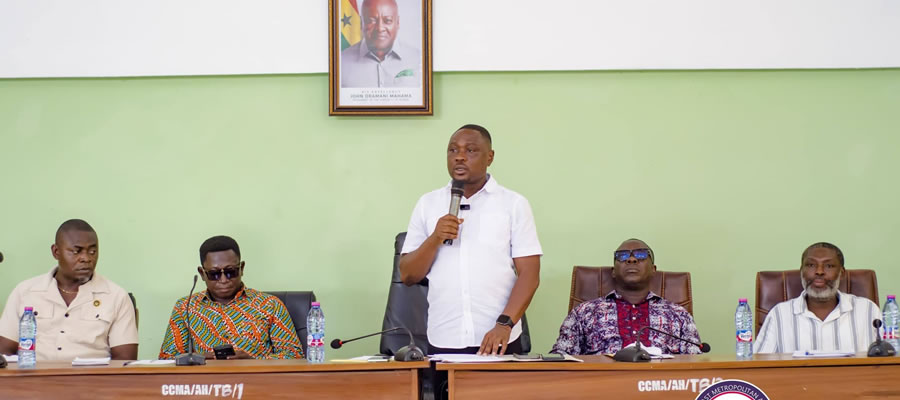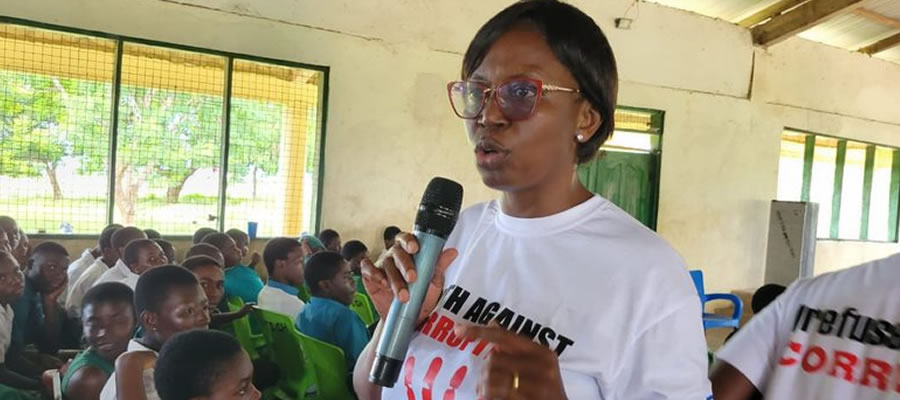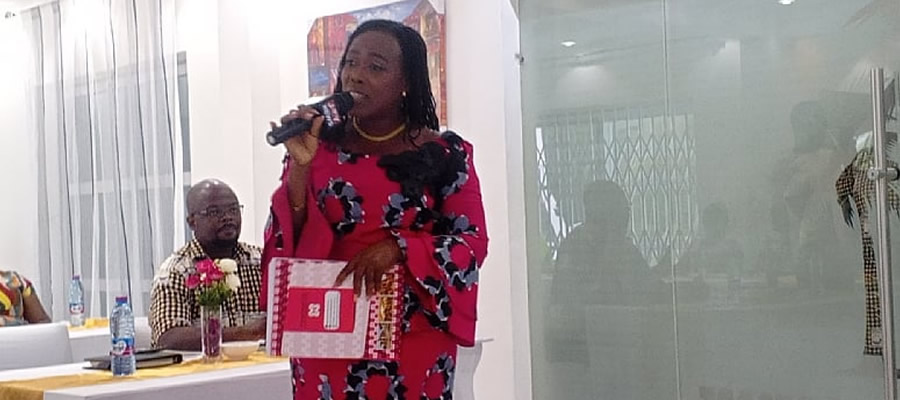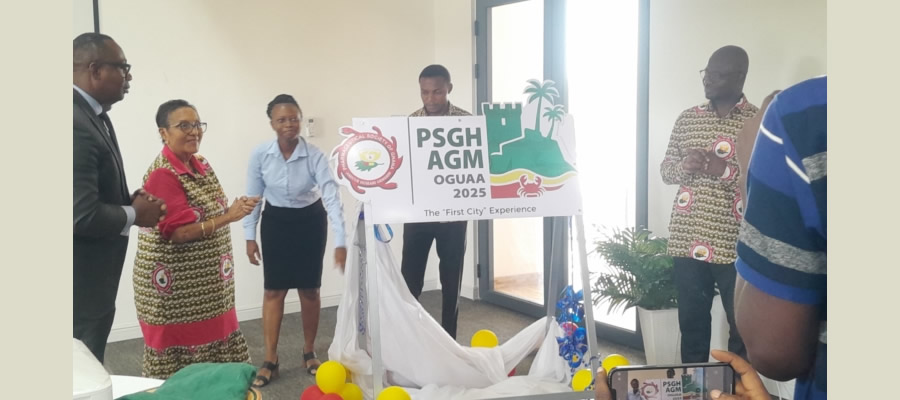

The Metropolitan Assembly is the highest governing body in the city and exercises its executive and administrative functions through the Metropolitan Authority, which is chaired by the Metropolitan Chief Executive. The city has 45 electoral areas, two constituencies (Cape Coast North and Cape Coast South) and two Sub-Metropolitan District Councils. In addition, there are seven mandatory Subsidiary Committees.
For administrative effectiveness, the Metropolitan Chief Executive (DCE) is supported by bureaucratic staff headed by a Metropolitan Co-ordinating Director (DCD) and a number of Departments. The current functional departments are;
1. Central Administration;
2. Budget and Rating;
3. Trade, Industry and Tourism (Ghana Enterprise Agency, Culture and Cooperative);
4. Agriculture;
5. Works;
6. Urban Roads;
7. Waste management;
8. Transport;
9. Disaster Prevention (NADMO);
10. Physical Planning;
11. Social Welfare and Community Development;
12. Education;
13. Health (Health Directorate and Environmental Sanitation Unit);
14. Statistics;
15. Human Resource;
16. Birth and Death;
17. Natural Resource Conversation (Forestry Commission), and
18. Finance.
Together, all the Department constitute the Metropolitan Planning Coordinating Unit (MPCU) headed by the Metropolitan Coordinating Director with the Metropolitan Planning Officer as the Secretary. There are other member institutions on the MPCU such as traditional authority, private sector, agents of central governments functionaries and Civil Society Organizations.
Figure 4: Organogram of CCMA
Assembly Set - Up
The Cape Coast Metropolitan Assembly (CCMA) comprises 42 elected members from the electoral areas, 18 appointed members, the Municipal Chief Executive and a Member of Parliament who has no voting right.
The Metropolitan Assembly has 22 members Executive Committee, which takes responsibility for the performance of executive and administrative functions of the Assembly.
The Executive Committee comprises the following sub-committees:-
Finance and Administration
Development Planning
Justice and Security
Social Services Works
Environment and Tourism
Women and Children
The Assembly’s functions cover the following areas
1. The preparation of development plans and budgets relating to the approved plans.
2. Formulating and executing plans, programmes and strategies for the effective mobilisation of resources for the overall development of the District.
3. Promoting and supporting production activity and social develop in the district, and removal of obstacles to initiative and development.
4. Initiating programmes for the development of basic infrastructure.
5. Developing, improving and managing human settlements and the environment.
6. Maintaining security and public safety in co-operation with national and local security agencies.
7. Ensuring ready access to Courts in the district for the promotion of justice.
8. Initiating, sponsoring or carrying out studies for enhancing functions.
9. Co-ordinating, integrating and harmonising and creation of programmes and projects under approved development plans for the district and other development programmes promoted or carried out by Ministries.
10. Departments, Public corporations and other statutory bodies and non-governmental organisations in the District.
The Cape Coast Assembly consists of
• The Metropolitan Chief Executive.
• Forty-two members, one each from the electoral areas in the District elected by universal adult suffrage.
• The Member of Parliament for Cape coast who has no voting right.
• Appointed members not exceeding 30% of the total membership of the assembly and appointed by the President in consultation with traditional authorities and other interest groups in the district.
The legislative and deliberative head of the CCMA is the Presiding Member who is elected by the Assembly from among its members every two years. Under CCMA Standing Orders the Presiding Member’s functions include the following:
1. Convening and presiding over all sittings of the CCMA except the inaugural meeting.
2. Ensuring that all meetings of the CCMA are conducted in accordance with the relevant rules and regulations.
3. Have a casting vote in event of equality of votes.
4. Power of adjourning of suspension of assembly sitting.
5. Together with the MCE represent the assembly on the RCC
The Political and executive head of Assembly is the Metropolitan Chief Executive. He is under Section 20 (2) of Act 462, the chairman of the executive Committee of the assembly. He is responsible for the day-to-day performance of the executive and administrative functions of the assembly and responsible for the supervision of the departments of the assembly. He is also the chief representative of the Central Government in the Municipality.
Under section 21 of act 462, the Executive Committee exercises the executive and coordinating functions of the Assembly. Its functions include the following:
• Co-coordinating plans and programmes of the sub-committees and submit these as comprehensive plans of action to the Assembly.
• Implementing resolutions of the Assembly.
• Overseeing the administration of the district in collaboration with the office of the Municipal Chief Executive.
• Recommending to the Municipal Assembly, the economic, social, spatial, and human settlement policies relating to the development of the district.
• Recommending to the Assembly the integration and co-ordination of the processes on planning, programming, budgeting and implementation.
• Initiation and implementation of development programmes and projects at the district level and recommendation to the Municipal Assembly the harmonisation of the development policies.
• Recommending the monitoring and evaluation of all policies, programmes and projects to the assembly.
• Develop and execute approved plans of the Unit Committees and Zonal Councils within the area of authority of the Municipal Assembly
.• The Executive Committee has the following mandatory sub-committees:
1. Development Planning Sub-Committee
2. Social Services sub-Committee
3. Works sub-Committee
4. Justice and Security Sub-committee
5. Finance and Administration Sub-Committee
In addition to the above sub-committee provided for under Section 24 (1) of the Act 462, the Assembly has established the following additional sub-committees of the executive committee.
i. Environment and Tourism sub-committee and
ii Women and Children Sub-committee
As provided for under Section 25(1) of Act 462 every sub-committee is responsible for collating and deliberating on issues relevant to it as the Assembly may direct and shall submit its recommendation to the Executive committee.
The municipality accommodates the Central Regional departments and Organisations which are responsible to the Regional co-ordinating Council.
However the following is the list of departments and organisations that fall under CCMA:
• Municipal Directorate of Ghana Education Service (GES)
• Municipal Directorate of Health Services (GHS)
• Municipal Directorate of Food and Agriculture (MOFA)
• Department of Fisheries
• Department of Community Development
• Department of Social Welfare
• Department of Town and Country Planning
• Public Works Department
• Forestry Department
• Department of Parks and gardens
• Department of Feeder Roads
• Birth and Deaths
• Controller and Accountant-General’s Department
• Municipal Fire Service
• Ghana Library Board
• Information Services Department
• Department of Co-operatives
• Department of Rural Housing
• Department of Game and wildlife
• Department of Youth & Sports
The first schedule of the Local Government Act, 1993 (Act 462) however establishes thirteen decentralised departments for the Municipal Assembly which are to replace the twenty-two (22) decentralised departments currently in existence, and listed above. These departments that came in force through the passing of the legislative Instrument are:
• Central Administration Department
• Finance Department
• Education, Youth and Sport Directorate (GES)
• Municipal Health Directorate (GHS)
• Directorate of Agriculture (MOFA)
• Physical Planning Department
• Social Welfare and Community Development
• Natural Resources Conservation Department, Forestry Game and Wildlife
• Works Department
• Industry and Trade
• Transport Department
• Disaster Prevention Department
• Urban Roads
The departments of the Municipal assembly are, according to Section 33 of the Civil service Law, 1993 (PNDC Law 427) direct establishments of the 13 decentralised departments.The development plans and budgets of these departments will be incorporated into the Medium-Term and Annual District Plans and Budgets.
Institutional structures below the Municipal Assembly
In pursuance of Section 3(3) of the act 462, the Legislative Instrument (1994) 1589), provides for the establishment of Zonal Councils and Unit Committees as the sub-district and community structures respectively for the completion of the decentralisation programme in the municipality. These structures are however not yet established.
The functions of the Zonal Councils include assisting the Assembly in mobilising local resources as well as managing environmental issues in the zone. The Unit committees on the other hand take over all the functions of the former Town/Village Committees. They also assist the assembly to;
1. mobilise local resources
2. Monitor the implementation of development projects
3. Organise communal and voluntary work
4. Make proposals for the levying and collection of rates through the zonal council as well as supervise staff of the Assembly assigned duties in its area of authority
5. Civil Society Organisations / Non-Governmental Organisations
Organisations that are independent of the government have existed in Ghana for many years. These range from Asafo groups (traditional armies), ethnic groupings, clans and benevolent, religious groups and students associations. Some of these groups were already active during the independence struggle, before political parties were formed in Ghana.
Non-Governmental Organisations (NGO’s) and Community Based Organisations (CBO’s), as they are known now, were relatively few in the country until recently. A number of NGO’s and CBO’s operate in the Cape Coast Assembly but their number as well as their impact on the socio-economic lives of the people as compared to other areas of the country is insignificant.
The Private Sector
Due to the fact that Cape Coast is the Regional and Municipal capital has always been a trading and fishing town, the private sector is relatively well developed and is an active player in the development of the Municipality. Most of the occupations do have formal organisations. For example an important group like the Fishermen are not formally organised but have a Chief Fisherman who can call all the fishermen at all times to discuss important issues. The fishmongers have also elected a queen who can call meetings at all times like the market women who are also organised along the lines of their occupational groups.
The Informal Sector is becoming more and more important as key player in the developmental process. Small Kiosks, shops, and street vendors can be found on the streets. This informal sector is a major contributor to the economy; however it can also become a nuisance and a health hazard. Especially, along main streets and several connecting streets, the number of informal and often unauthorised structures has become a nuisance. =Kiosks are blocking the streets and walkways and contribute to the chaotic traffic situation in the Municipality, especially the Central Business District (CBD) of Cape Coast Township. There is therefore an urgent need to review the present situation and come out with guidelines for structures for informal sector traders.
Hazards, Disaster and Security
Human activities in the exploitation of natural resources have brought with its sustainability challenges. Activities such as indiscriminate felling of trees, degradation of vegetative cover, indiscriminate refuse dumping, pollution of water bodies, bush and charcoal burning, bad mining and hunting practices have been ongoing. These have the potential of disturbing the ecological balance and sustainability of the natural environment.
The effects of these human activities have been the negative impact of climate change on the agricultural sector and the ecology including altered rain fall pattern, rise in atmospheric temperature, increased land degradation and loss of arable land, harvest failures from improper adaptive strategies and reduction in nutrition for livestock, risk from sea level rise such as coastal inundation and erosion, population displacement, salt water intrusion into fresh water resources, invasion and destruction of mangrove ecosystem, coastal wetlands and beaches along with their associated economic and social importance such as being sites for migratory birds, loss of habitat of several species including marine turtles leading to the disruption of sources of livelihoods especially fishing and agriculture.
The Police Service in collaboration with the Metropolitan Security Committee (MESEC) has maintained peace in the city.
Date Created : 6/19/2025 4:08:11 AM













 facebook
facebook
 X
X
 Youtube
Youtube
 instagram
instagram
 +233 593 831 280
+233 593 831 280 0800 430 430
0800 430 430 GPS: GE-231-4383
GPS: GE-231-4383 info@ghanadistricts.com
info@ghanadistricts.com Box GP1044, Accra, Ghana
Box GP1044, Accra, Ghana